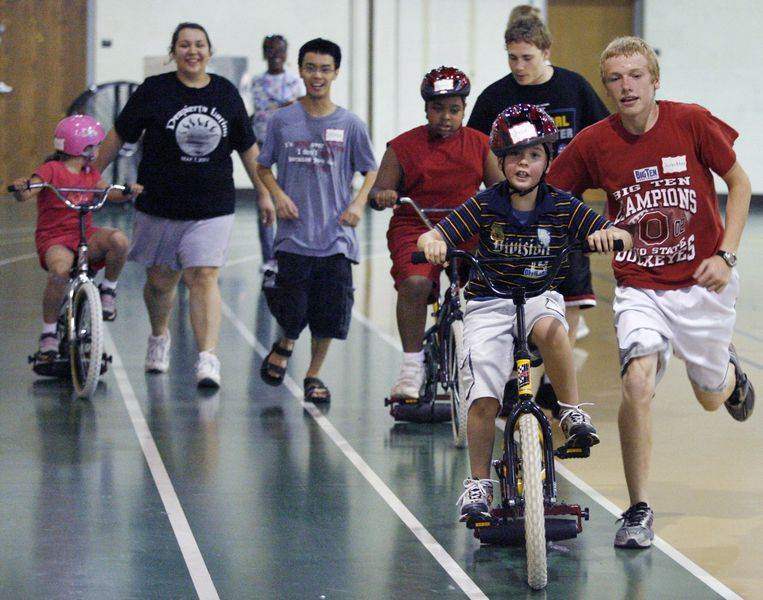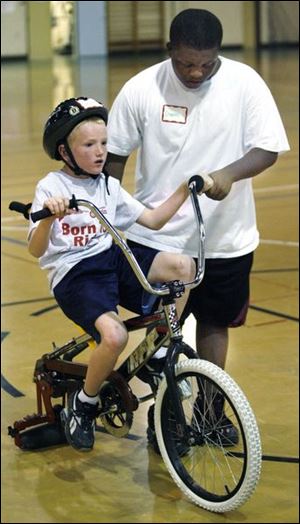
Engineer's camp helps disabled kids learn to bike
8/13/2008
Jonathan Niese, 16, helps Steve Chirgott, 12, in the Lose the Training Wheels camp at the University of Toledo's Health Education Center. The engineer organizing the event used his knowledge of the mathematics of movement.

Jonathan Niese, 16, helps Steve Chirgott, 12, in the Lose the Training Wheels camp at the University of Toledo's Health Education Center. The engineer organizing the event used his knowledge of the mathematics of movement.
With his father encouraging him, Mario Ramirez peddles meticulously, wobbling slightly around a corner as he syncs his mind and body with his first-ever bicycle.
This childhood rite of passage is a familiar scene to many, but one that can seem like a distant dream for some youngsters with disabilities, like 12-year-old Mario, who has Down syndrome.
That is changing this week for 32 handicapped children who are at the University of Toledo's Health Education Center, where Richard Klein has brought his specially engineered bicycles for the Lose the Training Wheels camp program.
Mr. Klein, a retired professor from the University of Illinois in Champaign, has applied his studies on the mathematics of movement to develop back wheels perfect for building riding skills.
He has shed training wheels, which he believes create bad habits.
"What we're looking for in the end is that they'll discover they can maintain balance," he said. "We've slowed down the speed of the bike, but the dynamics are the same."

Daniel Rocker works with Jake Emch, 8, of Oregon as he practices on a bicycle with a roller instead of a back wheel. Such camps are planned for 53 U.S. and Canadian cities this year.
The crafty engineer retains the traditional front wheel and frame, but fixes a roller substitute on the back of his bicycles. The interchangeable rollers have varying levels of stability, and are traded out as the children learn to stay upright.
The goal by the end of the five-day program is to ride a two-wheeler.
"It's a confidence-building process, and it becomes much bigger than riding a bike," said Martin Ramirez of Maumee.
He said his son Mario now wakes up excited about riding, exuberantly repeating, "Gonna get you," a cheer his father uses when encouraging the Gateway Middle School student on the bicycle.
"[People] will see he has Down syndrome for about the first 10 seconds, then he'll just be another bike rider," Mr. Ramirez said.
In 2001, Mr. Klein held two camps in California and Wisconsin where he introduced the rollers. Since then, his program has spread across the country and into Canada. The 2008 lineup includes 53 cities.
Mr. Klein said the experience is as much about self-esteem building and socialization as it is about actual bicycle riding.
"There are easily 1 million children in the country who could benefit from this," Mr. Klein said.
The Lucas County Board of Mental Retardation and Development Disabilities, the University of Toledo, and the West Sectional Special Olympics are sponsoring the camp for the first time in Toledo.
The Toledo program hosts riders 8 years and older, all of whom have Down syndrome, autism, or similar disabilities.
Four, 75-minute sessions are being held daily through Friday, with eight children at each session.
"Ideally, we'd love to do it again in this area," said Cheryl Tresnan, a program organizer, who said the camp's popularity led to a waiting list.
Ms. Tresnan noted the importance of local sponsors and volunteers, who work one-on-one with the children.
One is Adam Tran, 17, a student at Toledo Early College High School, who heard about the camp through the University of Toledo's EXCEL initiative which works to ready students for college.
"A lot of people see volunteering as an obligation, but we really enjoy this," Adam explained as he raced around the gymnasium, tracking the balance of Christopher Sauceda, 11, of Curtice.
"It's a physical process and a spiritual process. You really get to see these children progress."
At first, he said, many of the children were timid, afraid of pushing their own limits.
"They sometimes grip the handlebars so tight that they would get blisters," Adam said.
But he added that it did not take long for most of the youngsters to become comfortable on the bicycles.
Mr. Klein said he would like to expand the effort and is looking to pilot the first in-school program soon.
"If I can get a child to ride a bike, then they have been brought up into a mainstream activity, and they can blossom," he said.
Contact Matthew Eisen at:
meisen@theblade.com
or 419-724-6077.